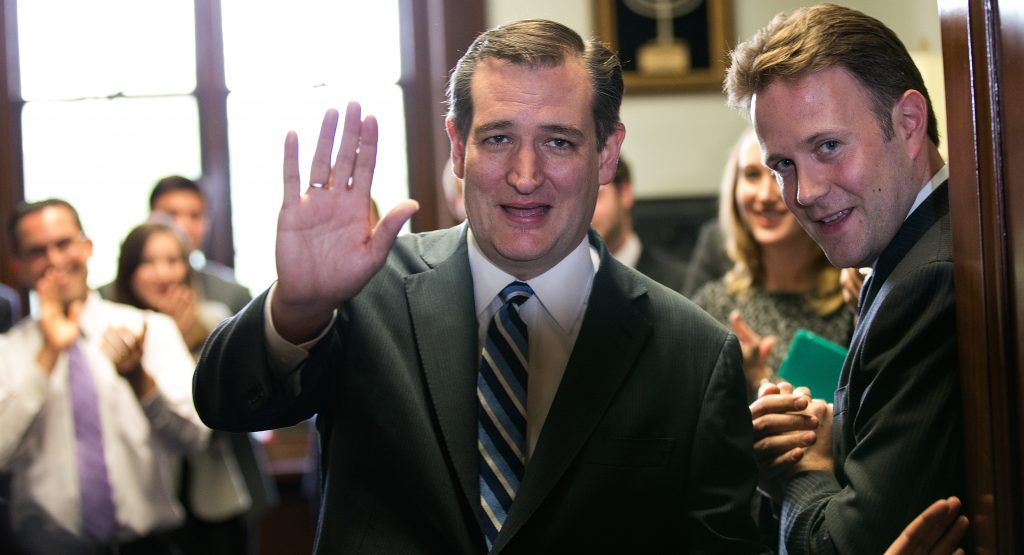

This is the web version of VoxCare, a daily newsletter from Vox on the latest twists and turns in America’s health care debate. Like what you’re reading? Sign up to get VoxCare in your inbox here.
Sen. Ted Cruz’s Consumer Choice Amendment sets up a cruel reality for Americans who are sick and poor.
The Texas Republican’s plan would allow health insurers to offer skimpy plans in the individual market, so long as they also included one option that covers all Affordable Care Act-mandated benefits.
In practice, this would mean some plans exclude expensive benefits like maternity care and mental health coverage. The 21 million Americans who buy their own health coverage could choose which plan they preferred.
Health policy experts know exactly how this would play out: Healthy people would pick the skimpier plan, and sicker people would enroll in the more robust plan. Individual market enrollees would game the system; a couple expecting a baby, for example, would be expected to upgrade to the plan that covers maternity care for one year before returning to the cheaper plan they had before.
“Separating the sick and healthy will drive up costs,” says Ceci Connolly, the chief executive of the Alliance of Community Health Plans.
There is no theory in Cruz’s policy of what happens to Americans with significant health care needs, no grand plan to rein in the costs of a plan that only covers sick people. Premiums would rise, as each member would require significant spending.
We’re not just talking about those with acute illnesses like cancer but also Americans with chronic conditions such as diabetes or hypertension.
Cruz’s plan would mean these people will simply have to pay a lot more to access health care than they do under the current health care system.
“Someone with chronic illness, they’re going to end up wanting to buy the more comprehensive coverage,” says Joe Antos, a health policy expert with the conservative American Enterprise Institute. “This means that people with those kinds of illnesses will end up paying more. Even if they receive a federal subsidy, they will likely see higher cost sharing.”
The Senate health bill does include federal subsidies to reduce premiums. Those subsidies would hold down costs for these people, a bit. But those subsidies are meant to purchase a plan with very high cost sharing. The deductible for these plans is expected to be around $6,000. This is little protection for someone living around the poverty line, earning $11,000 annually.
Cruz’s theory of providing care to sick Americans, at the end of the day, is a simple one: ask Americans to pay a lot more to cover their own medical bills.
This is necessarily what happens when you repeal the taxes that pay for the Affordable Care Act’s coverage expansion. It was already the case with the Senate and House health care bills, which both repeal hundreds of billions of dollars in Affordable Care Act taxes.
But the Cruz amendment takes this a step further. He takes away another source of funding for sicker people: the premiums of healthy individual market enrollees. Blending the two together lowered prices for those with high medical bills (with the trade-off of raising costs for the healthy).
Segmenting the two populations means the healthy save and the sick spend — or the healthy who suddenly become sick end up with more significant medical bills.
“The people who don’t know something will happen and come down with something, those are the ones at issue,” Antos argues. “It’s not the people who planned ahead and bought the more expensive plan. It’s those who didn’t.”
Contents
Chart of the Day: Obamacare insurers turning a profit, so far, in 2017
/cdn.vox-cdn.com/uploads/chorus_asset/file/8829071/9068_figure_21.115928.png)
Obamacare marketplaces keep refusing to collapse. The latest data comes from the Kaiser Family Foundation, which shows increasingly strong financial performance from the health plans that sell on the Affordable Care Act marketplaces. “First quarter premium and claims data from 2017 support the notion that 2017 premium increases were necessary as a one-time market correction to adjust for a sicker-than-expected risk pool,” KFF analysts conclude. Read more from the Kaiser Family Foundation.
Kliff’s Notes
Your daily top health care reads, with research help from Caitlin Davis
Today’s top news
- “Following Recess, GOP Health-Care Push Gets Trickier”: “The focus on possible steps to take if Senate Republicans can’t unite around a health bill is the strongest sign yet of the growing pessimism about the fate of the GOP legislation and the party’s seven-year pledge to topple the ACA. Some Republicans now say a vote to pass a bill could stretch beyond August, if there is a vote at all.” —Stephanie Armour, Wall Street Journal
- “Mike Pence urges Senate Republicans to pursue full Obamacare repeal if consensus can’t be reached”: “Vice President Mike Pence said Monday that Republicans should move forward with a bill that only repeals Obamacare if they can’t generate consensus around a plan that repeals and replaces the healthcare law. ‘If they can’t pass this carefully crafted repeal-and-replace bill, we ought to repeal only,’ Pence said in an interview on Rush Limbaugh’s show.” —Melissa Quinn, Washington Examiner
- “Senate GOP eyes ObamaCare repeal vote next week”: “Sen. John Cornyn (R-Texas) said on Monday that Senate Republicans want to roll out a new draft of their bill to repeal and replace ObamaCare as soon as this week, with a vote next week. ‘We’re just trying to get a good picture of what the alternatives are, and hopefully next week we’ll be prepared to take the bill up and vote on it,’ the No. 2 Senate Republican told reporters.” —Jordain Carney, the Hill
Analysis and longer reads
- “Survey Says: Medicaid Recipients Really Like Their Coverage And Care”: “A new study released by Harvard’s Chan School of Public Health shows that people enrolled in Medicaid are overwhelmingly satisfied with their coverage and care. The researchers looked at survey data collected by the Centers for Medicare and Medicaid Services from more than 270,000 people who were enrolled in Medicaid in 2013.” —Alison Kodjak, NPR
- “Inside the Democrats’ civil war over abortion”: “Democratic National Committee Chairman Tom Perez waded into the heated debate earlier this year when he said all Democratic candidates must support a woman’s right to make choices about her own health. ‘That is not negotiable,’ Perez told the Huffington Post. The DNC later said it doesn’t believe in litmus tests.” —Lindsay Wise and Bryan Lowry, McClatchy
- “Desperate for addiction treatment, patients are pawns in lucrative insurance fraud scheme”: “Drug users, desperate to break addictions to heroin or pain pills, are pawns in a sprawling national network of insurance fraud, an investigation by STAT and the Boston Globe has found.” —David Armstrong, STAT, and Evan Allen, Boston Globe
- “Republican Steamrolling Should Terrify Wall Street”: “There’s also very little evidence that the Republican health care plan will work in the real world as described, and in fact not very much evidence that Republicans care. Their overwhelming goal, as far as anyone can tell, is to pass something that they can call ‘repealing and replacing’ Obamacare; the goal of a smoothly-functioning health care system just doesn’t seem to matter very much to them.” —Jonathan Bernstein, Bloomberg
Join the conversation
Are you an Obamacare enrollee interested in what happens next? Join our Facebook community for conversation and updates.
[“Source-vox”]




